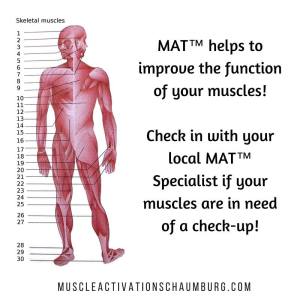As a Muscle Activation Techniques™ (MAT™) specialist and personal trainer in Schaumburg, I know that many people seek out MAT™ because it makes A LOT of people feel better! This is one reason why I absolutely LOVE MAT™ and why I love being an MAT™ Specialist.
There is one problem with this, though. MAT™ does not treat pain. It never has and never will. In this blog post, I want to discuss what you can expect from an MAT™ session and how you can know you are making progress, even when pain symptoms are not changing.
Let’s start with the obvious, again. MAT™ does not treat pain.


This means that if your pain goes away or gets better, it is a side effect of what MAT™ is REALLY aiming to do. Changes in symptoms, like pain, can be REALLY COOL and ENJOYABLE side effects! But, if you judge the effectiveness of your MAT™ session by the change in your pain symptoms, you may be disappointed.
Let’s look at what MAT™’s main mission is:
“MAT™ Client Mission Statement: The MAT™ Specialist will continually endeavor to improve the lives of our clients by effectively assessing and managing an individual’s muscular system capabilities, to start and sustain participation in exercise.”
The entire system of MAT™ is centered around the specialist helping his or her clients improve and maintain their muscle system to become or to stay active! There are over 640 individual muscles in your body. Each muscle has a similar function. Muscles send and receive stimulus from the central nervous system (brain and spinal cord) to generate and regulate their tension. This tension has the opportunity to pull its attachment points together. An MAT™ specialist knows how to assess and address many of the muscles in your body if there are issues with this sending/receiving signal process.
Here’s the interesting part — how is it that improving the function of your muscular system can make you feel better/great?!
When muscles are not contracting appropriately it can cause additional stress to be placed on certain areas of your body – joints, ligaments, bursae, meniscus, intervertebral discs, and other muscles (often known as “compensation”). This stress can feel very uncomfortable. Additionally, this stress could cause the start of an inflammatory process, a change in your ability to move, and a change in your ability to exercise (and get the health benefits of exercise).
When you seek out MAT™ or come to an MAT™ session, it is a valid reason to be there if you are experiencing discomfort in your body. Discomfort is a great signal to let you know something is going on. But remember, judge the quality of your session by the change in what MAT™ is ACTUALLY assessing and addressing. MAT™ is helping your muscles contract and do their jobs better!
– Julie
Did you enjoy this post? Give it a share below and subscribe to our mailing list to receive our most popular posts every week ?